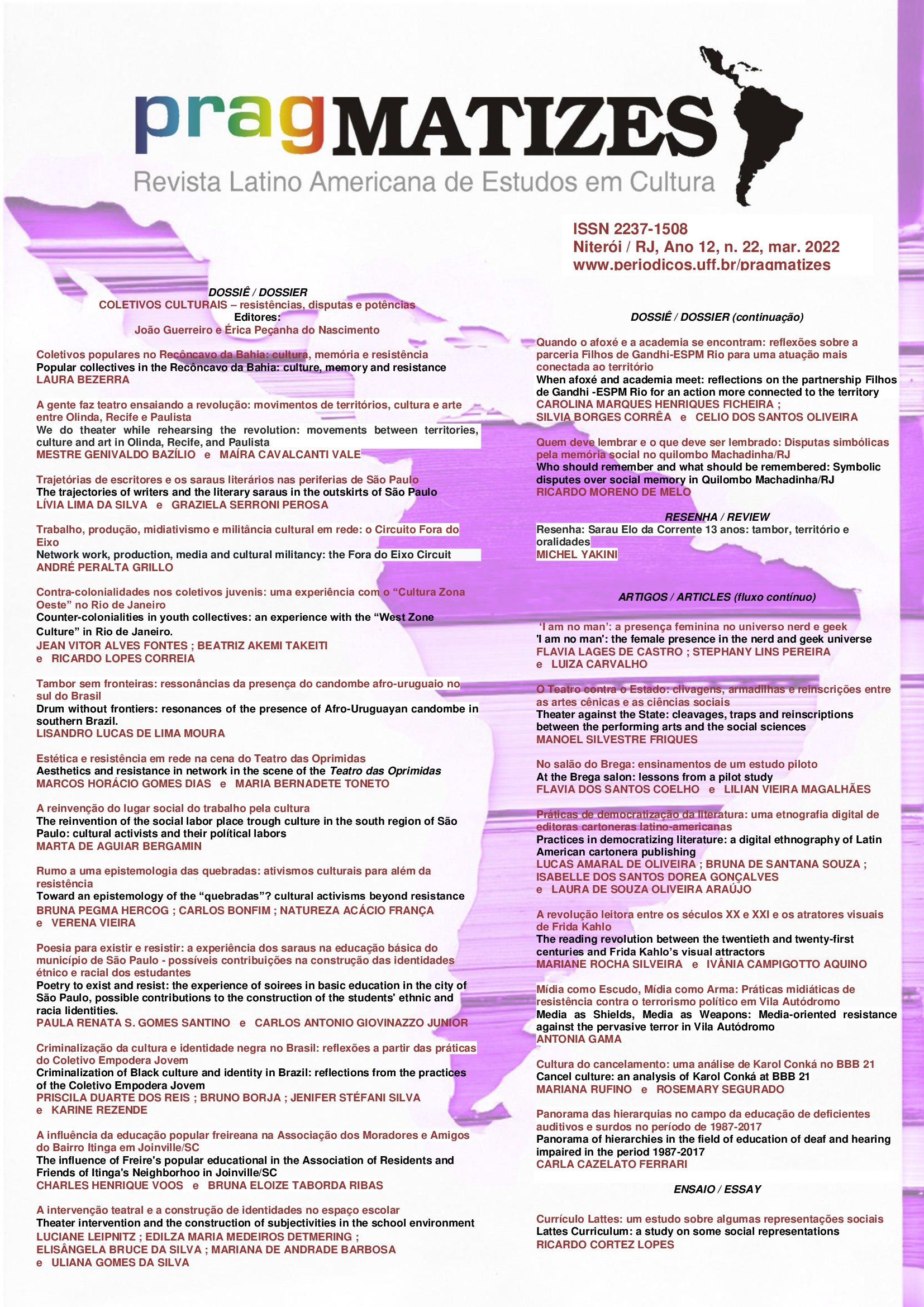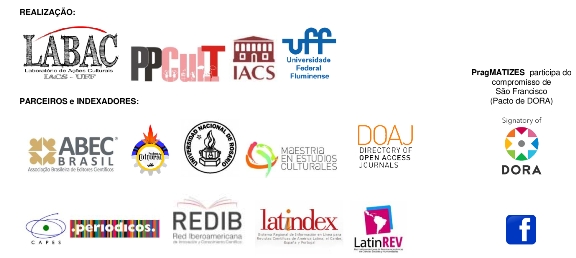The trajectories of writers and the literary saraus in the outskirts of São Paulo
DOI:
https://doi.org/10.22409/pragmatizes.v12i22.51466Keywords:
Literature, Periphery, Cultural Capital, sarauAbstract
The research constituted as object of study the emergence of poetry soirees in the outskirts of the city of São Paulo, between 2014 and 2016, through the study of the trajectories of their writers. Articulating the dimensions of culture and education, the research focused on studies about culture, from the sociological perspective of Pierre Bourdieu, questioning the historical processes of acquisition of cultural capital, relating social origin, school trajectory and the poetry soirees. The fieldwork was carried out in four poetry soirees, in different regions of São Paulo (south, north, east). Aiming to identify the position of the neighborhoods in which the soirees take place, and where we would conduct the field research next, we carried out a statistical study of the sociodemographic characteristics of the population residing in these neighborhoods. By consulting social networks (Facebook), we composed a first list of 22 events that regularly took place in São Paulo, with activities publicized on social networks. Then, we defined those in which we conducted the semi-structured interviews and direct observations, with leaders of four saraus. The interviews aimed to reconstruct their school trajectory, the other cultural movements in which they participated, and the dispositions acquired in this process, in order to shed light on the emergence of the poetry soirees that flourished in São Paulo during the period. To obtain information about the public present in the researched, we applied a questionnaire (on paper), with which we produced information about schooling, geographical origin, age, etc. We concluded that access to schooling, especially access to higher education, contributed decisively to the formation of dispositions towards acting in the literary field, both on the part of poets and writers, and on the part of the public. Resident in the outskirts of São Paulo, they are graduates of higher education and high school. Among the writers, many of them have a degree in Literature and seek to develop these literary practices professionally, thus circumventing the exclusion from the dominant circuits of literature in the city.
Downloads
References
BONDUKI, Nabil; ROLNIK, Raquel. Periferias: ocupação do espaço e reprodução da força de trabalho. São Paulo: Prodeur/FAU-USP, 1979.
BOURDIEU, Pierre. A distinção: Crítica Social do julgamento. São Paulo: Edusp, Porto Alegre: Zouk, 2008.
BOURDIEU, Pierre. A economia das trocas simbólicas. São Paulo: Perspectiva, 2011.
BOURDIEU, Pierre. As regras da arte. São Paulo: Companhia das Letras, 2002.
BOURDIEU, Pierre. O poder simbólico. Rio de Janeiro: Bertrand Brasil, 1989.
BOURDIEU, Pierre. Questões de sociologia. Lisboa: Fim de século, 1984.
BOURDIEU, Pierre. Razões práticas: sobre a teoria da ação. Campinas: Papirus, 1996.
CABANES, R.; GEORGES, I.; RIZEK, C.; TELLES, V. Saídas de emergência: ganhar/perder a vida na periferia de São Paulo. São Paulo: Boitempo, 2011.
CALDEIRA, Teresa. A política dos outros. O cotidiano dos moradores de periferia e o que pensam do poder e dos poderosos. São Paulo: Brasiliense, 1984.
CANDIDO, Antonio. Literatura e Sociedade – Estudos de Teoria e História Literária. Rio de Janeiro: Ouro sobre Azul, 2011.
CASTEL, Robert. A discriminação negativa – Cidadãos ou Autóctones? Petrópolis: Vozes, 2008.
DALCASTAGNÈ, Regina. Literatura brasileira contemporânea: um território contestado. Rio de Janeiro: Editora da UERJ; Vinhedo: Horizonte, 2012.
FERRÉZ. Manifesto de abertura. In: Literatura Marginal (org.). Caros Amigos Especial. Literatura Marginal: a cultura da periferia. Ato I. São Paulo, agosto de 2001.
KOWARICK, Lucio. A espoliação urbana. Rio de Janeiro: Paz e Terra, 1979.
MIRANDA, Fernanda Rodrigues de. O campo literário afro-brasileiro e a recepção de Carolina Maria de Jesus. Revista Estação Literária, UEL, Londrina, Vagão-volume 8 parte A, p. 15-24, dez. 2011.
NASCIMENTO, Érica Peçanha. É tudo nosso! Produção cultural na periferia paulistana. (Doutorado em Antropologia). Universidade de São Paulo, 2011.
NASCIMENTO, Érica Peçanha. Literatura Marginal: os escritores da periferia entram em cena. (Mestrado em Antropologia). Universidade de São Paulo, 2006.
PABLO, Tiaraju d’Andrea. A formação dos sujeitos periféricos: Cultura e Política na periferia de São Paulo. (Doutorado em Sociologia). Universidade de São Paulo, 2013.
PEROSA, Graziela Serroni et alli. O espaço das desigualdades educativas no município de São Paulo. Pro-Posições, São Paulo, vol. 26, n. 2, p.99-118, 2015.
PEROSA, Graziela Serroni; DANTAS, Adriana Santiago Rosa. A escolha da escola privada em famílias dos grupos populares. Educ. Pesqui., São Paulo, v. 43, n. 4, p. 987-1004, out./dez., 2017.
SALOM, Julio Souto. Combater a subcidadania disputando o jogo literário: uma contribuição ao estudo da Literatura Marginal Periférica. (Mestrado em Literatura). Universidade Federal do Rio Grande do Sul, Porto Alegre, 2014.
VAZ, Sérgio. Cooperifa: Antropofagia periférica. Rio de Janeiro: Aeroplano, 2008.
WACQUANT, Loïc. Punir os pobres: a nova gestão da miséria nos Estados Unidos. Rio de Janeiro: Revan, 2003.
WILLIAMS, Raymond. A cultura é de todos. [Culture is Ordinary; traduação de Maria Elisa Cevasco] São Paulo: Departamento de Letras, USP, 1958.
Published
How to Cite
Issue
Section
License

This work is licensed under a Creative Commons Attribution 4.0 International License.
By forwarding an original to PragMATIZES, the authors agree that the copyright related to it is transferred to the Publishing. Articles and other writings are made available in PDF format from their publication, and they can be downloaded to institutional repositories and personal pages, provided that with their proper bibliographic indication.



